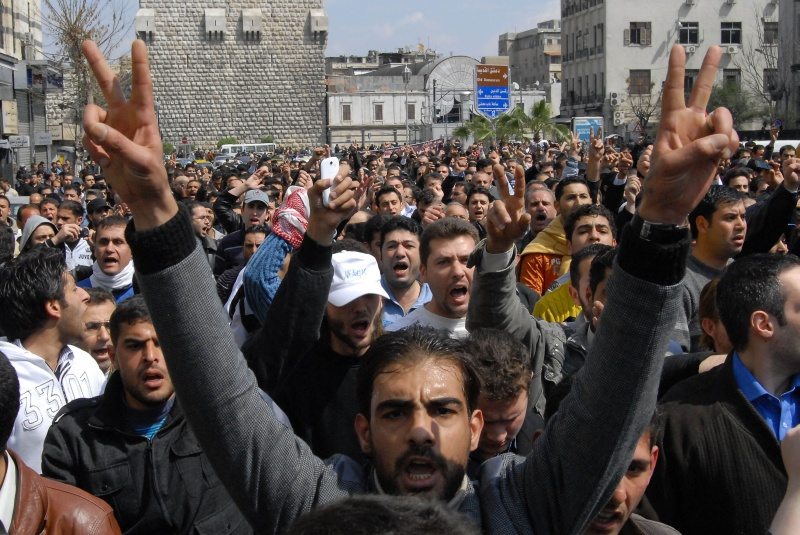Syrian troops on Monday pushed an assault on a central rebel bastion, with dozens reportedly killed across the country, as Saudi Arabia warned that Kofi Annan’s peace efforts appeared to be failing.
The EU, meanwhile, slapped fresh sanctions on Damascus, while Russia said it was “absolutely clear” Al-Qaeda was behind last week’s twin bomb attacks in Damascus that killed 55 people and vowed to continue to arm the regime.
The Syrian Observatory for Human Rights said three troop carriers were destroyed in clashes that erupted at dawn on the outskirts of Rastan, a rebel-held city in restive Homs province of central Syria.
At least 23 soldiers were killed in the Rastan clashes, it said.
Four rebel fighters, among them a lieutenant who defected, also died in the fighting as well as two civilians, and regime gunfire reportedly left three civilians dead in the nearby city of Homs.
Regime forces launched an offensive on Rastan at the weekend, encountering heavy resistance from rebels seeking the ouster of President Bashar al-Assad’s regime.
“The regime forces in the course of two hours fired 300 rockets at Rastan before launching their assault,” Sami Kurdi, a spokesman for the rebel Free Syrian Army, told AFP from Rastan.
The Observatory also reported deadly violence elsewhere on Monday, putting the total daily toll of at least 37.
The bloodshed comes despite a month-old ceasefire brokered by UN-Arab League envoy Annan as part of a plan aimed at ending violence that has swept Syria since March 2011 when a popular revolt erupted against Assad’s regime.
Part of the plan includes the deployment in flashpoint areas of around 300 UN military observers. By Sunday, 189 observers were on the ground, the UN mission in Syria said.
In Riyadh, Saudi Arabia’s foreign minister warned Monday that confidence in Annan’s peace mission was fading fast because of the relentless bloodshed.
“Confidence in the efforts of the international envoy is falling rapidly because fighting and bloodshed continue,” Prince Saud al-Faisal told reporters after Riyadh hosted a summit of Arab leaders of the Gulf.
More than 12,000 people, the majority of them civilians, have died since the Syrian uprising began, according to the Observatory, including more than 900 killed since the April 12 truce.
On the diplomatic front, EU foreign ministers meeting in Brussels slapped a 15th round of sanctions on Syria.
The new European Union sanctions, to take effect on Tuesday, mean 128 people and 43 firms or utilities are now targeted by an assets freeze and travel ban for backing the regime’s 14-month campaign of relentless repression.
“The continuing violence is appalling,” said EU foreign policy chief Catherine Ashton. “As long as the repression continues, we will continue to put pressure on those responsible for it.”
Ashton said the bloc at the weekend delivered a fleet of 25 armoured vehicles to help Annan’s observer mission, deployed under his peace plan which the EU sees as the only possible way to avoid all-out civil war in Syria.
Syria-linked violence has also spilled across the border into Lebanon, with eight people killed since Saturday in sectarian clashes in the northern port city of Tripoli, according to Lebanese security officials.
Lebanese army troops were deployed late on Monday in hotspots, ordering gunmen off the streets.
In some of the worst violence seen in Syria since the conflict erupted 14 months ago, twin suicide bombings in Damascus last Thursday killed 55 people and wounded 372.
Russia’s foreign ministry pointed the finger of blame squarely at Islamist extremists, despite claims by the Syrian opposition that Assad’s government carried out the devastating attacks.
“For us it is absolutely clear that terrorist groups are behind this — Al-Qaeda and those groups that work with Al-Qaeda,” Deputy Foreign Minister Gennady Gatilov told reporters.
He added that the “massive” military support for the rebels required Russia not to leave its traditional ally defenceless and to continue supplying Assad’s army with certain “defensive” arms.
Al-Nusra Front, an Islamist group unknown before the Syrian revolt, released a video on Saturday claiming responsibility for the Damascus attacks.
Russia also warned Kosovo against allowing the training of Syrian opposition rebels on its territory, with its UN envoy Vitaly Churkin saying it could cause international friction.
In Cairo, the Arab League announced the postponement of a planned meeting of the Syrian opposition, initially due to take place on Wednesday and Thursday in the Egyptian capital.
In a statement, the Arab organisation said it had taken the decision, with no new date proposed, in response to a request from the opposition umbrella Syrian National Council and the National Coordination Council, the other main opposition faction.










